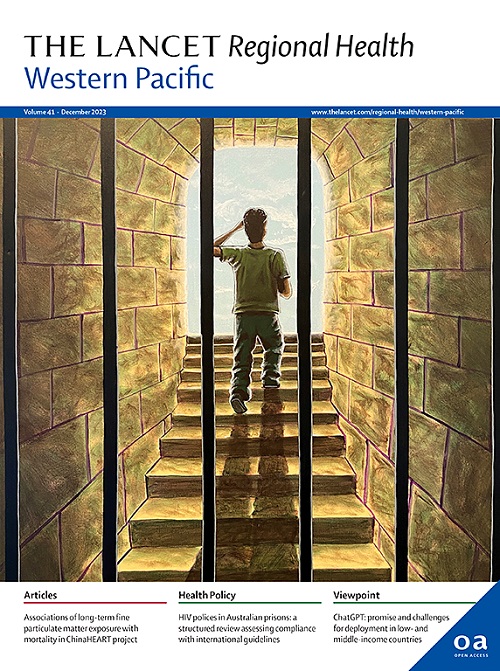斐济多物种耐碳青霉烯类生物爆发的成功管理:前瞻性基因组学强化调查和应对措施
IF 7.6
1区 医学
Q1 HEALTH CARE SCIENCES & SERVICES
引用次数: 0
摘要
背景斐济是一个太平洋岛国,正努力应对日益严重的抗菌药耐药性(AMR)威胁。方法通过一项既定的能力建设计划,对斐济殖民战争纪念医院(2022 年 1 月至 2023 年 10 月)发现的疑似耐碳青霉烯菌(CRO)进行了全基因组测序和分析。随着 CRO 的迅速增加,开展了包括详细基因组流行病学在内的联合疫情调查。医院员工共同设计并实施了多模式应对措施,并对循环菌株进行监测以评估影响。研究结果六个大型基因组群占所有测序 CRO 分离物的 73%(n = 223/304)。对四个基因组集群(鲍曼不动杆菌 NDM-1、鲍曼不动杆菌 OXA-23/OXA-58、大肠埃希菌 NDM-7、铜绿假单胞菌 NDM-1)进行了详细调查,受影响的病房因菌种而异。在对疫情进行干预后,大肠杆菌和铜绿假单胞菌群迅速减少,但鲍曼尼氏菌的传播仍然存在。耐卡巴培南病原体对斐济的卫生系统构成了重大威胁。在这种情况下,基因组学技术有助于了解 AMR 并指导成功的应对措施。这项工作由澳大利亚政府通过外交贸易部卫生安全中心、医学研究未来基金和国家卫生与医学研究委员会提供资助。本文章由计算机程序翻译,如有差异,请以英文原文为准。
Successful management of a multi-species outbreak of carbapenem-resistant organisms in Fiji: a prospective genomics-enhanced investigation and response
Background
Fiji is a Pacific Island nation grappling with the increasing threat of antimicrobial resistance (AMR). While genomic technologies are increasingly utilised to understand the emergence and spread of AMR globally, its application to inform outbreak responses in low- and middle-income settings has not been reported.
Methods
Through an established capacity building program, suspected carbapenem-resistant organisms (CRO) identified at Colonial War Memorial Hospital in Fiji (Jan 2022–Oct 2023) underwent whole genome sequencing and analysis. Following a rapid increase in CROs, a joint outbreak investigation including detailed genomic epidemiology was undertaken. A multi-modal response was co-designed and implemented by hospital staff, and circulating strains monitored to assess impact.
Findings
Six large genomic clusters accounted for 73% (n = 223/304) of all sequenced CRO isolates. Four genomic clusters (Acinetobacter baumannii NDM-1, A. baumannii OXA-23/OXA-58, Escherichia coli NDM-7, Pseudomonas aeruginosa NDM-1) were investigated in detail, with affected wards differing between species. Following outbreak interventions, E. coli and P. aeruginosa clusters decreased rapidly, however A. baumannii transmission persisted. Repeated international importation of CROs into Fiji were suspected.
Interpretation
Carbapenem-resistant pathogens pose a major threat to the health system in Fiji. Genomics technologies are useful for understanding AMR and guiding successful response, in these settings. Strategies to ensure access to, and judicious use of the technology are justified.
Funding
This work was funded by the Australian Government through the Department of Foreign Affairs and Trade Centre for Health Security, Medical Research Future Fund and National Health and Medical Research Council.
求助全文
通过发布文献求助,成功后即可免费获取论文全文。
去求助
来源期刊

The Lancet Regional Health: Western Pacific
Medicine-Pediatrics, Perinatology and Child Health
CiteScore
8.80
自引率
2.80%
发文量
305
审稿时长
11 weeks
期刊介绍:
The Lancet Regional Health – Western Pacific, a gold open access journal, is an integral part of The Lancet's global initiative advocating for healthcare quality and access worldwide. It aims to advance clinical practice and health policy in the Western Pacific region, contributing to enhanced health outcomes. The journal publishes high-quality original research shedding light on clinical practice and health policy in the region. It also includes reviews, commentaries, and opinion pieces covering diverse regional health topics, such as infectious diseases, non-communicable diseases, child and adolescent health, maternal and reproductive health, aging health, mental health, the health workforce and systems, and health policy.
 求助内容:
求助内容: 应助结果提醒方式:
应助结果提醒方式:


